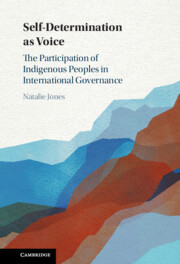
-
Select format
-
- Publisher:
- Cambridge University Press
- Publication date:
- January 2024
- January 2024
- ISBN:
- 9781009406321
- 9781009406314
- Dimensions:
- (229 x 152 mm)
- Weight & Pages:
- 0.709kg, 362 Pages
- Dimensions:
- Weight & Pages:
- Subjects:
- Public International Law, Law, Governance, Management
You may already have access via personal or institutional login- Subjects:
- Public International Law, Law, Governance, Management
Book description
Self-Determination as Voice addresses the relationship between Indigenous peoples' participation in international governance and the law of self-determination. Many states and international organizations have put in place institutional mechanisms for the express purpose of including Indigenous representatives in international policy-making and decision-making processes, as well as in the negotiation and drafting of international legal instruments. Indigenous peoples' rights have a higher profile in the UN system than ever before. This book argues that the establishment and use of mechanisms and policies to enable a certain level of Indigenous peoples' participation in international governance has become a widespread practice, and perhaps even one that is accepted as law. In theory, the law of self-determination supports this move, and it is arguably emerging as a rule of customary international law. However, ultimately the achievement of the ideal of full and effective participation, in a manner that would fulfil Indigenous peoples' right to self-determination, remains deferred.
Contents
Metrics
Altmetric attention score
Full text views
Full text views help Loading metrics...
Loading metrics...
* Views captured on Cambridge Core between #date#. This data will be updated every 24 hours.
Usage data cannot currently be displayed.
Accessibility standard: Unknown
Why this information is here
This section outlines the accessibility features of this content - including support for screen readers, full keyboard navigation and high-contrast display options. This may not be relevant for you.
Accessibility Information
Accessibility compliance for the PDF of this book is currently unknown and may be updated in the future.


